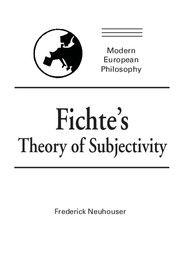Book contents
- Frontmatter
- Contents
- Acknowledgments
- Abbreviations
- Introduction
- 1 Origins of Fichte's theory: the notion of the unity of reason
- 2 The development of Fichte's project from 1793 to 1799
- 3 The self-positing subject and theoretical self-consciousness
- 4 The self-positing subject and practical self-determination
- Conclusion
- Bibliography
- Index
Introduction
Published online by Cambridge University Press: 05 June 2012
- Frontmatter
- Contents
- Acknowledgments
- Abbreviations
- Introduction
- 1 Origins of Fichte's theory: the notion of the unity of reason
- 2 The development of Fichte's project from 1793 to 1799
- 3 The self-positing subject and theoretical self-consciousness
- 4 The self-positing subject and practical self-determination
- Conclusion
- Bibliography
- Index
Summary
In 1795, in the first published version of his major philosophical work, Fichte declares that one of the fundamental goals of his thought is to bring “unity and coherence into the entire human being.” In describing his system in these terms, Fichte gives expression to the basic aim that motivates the specific project with which this book is concerned. That project can be characterized as an attempt to construct a “theory of subjectivity,” a theory that, to use the term Fichte himself preferred, provides an explanation of what it is to be an “I.” Since it is not immediately clear what such a project will involve, or why it is worthy of being undertaken, it will be necessary to say something about the general nature of Fichte's task before we attempt to understand it in full detail. In the first place, we shall need to know what exactly a theory of subjectivity is a theory of. Moreover, what are the philosophical problems that give rise to the need for such a theory? Finally, what role can a theory of subjectivity play in establishing the “unity and coherence” of the human being?
Let us begin with the most basic question of all: What is a theory of subjectivity? Or, more precisely, what is it that Fichte's theory of the subject aims to accomplish? As Fichte conceives of it, the basic goal of his theory is to develop an account of the essential nature of subjecthood, or to provide an explanation of what it is that makes a subject a subject.
- Type
- Chapter
- Information
- Fichte's Theory of Subjectivity , pp. 1 - 10Publisher: Cambridge University PressPrint publication year: 1990

